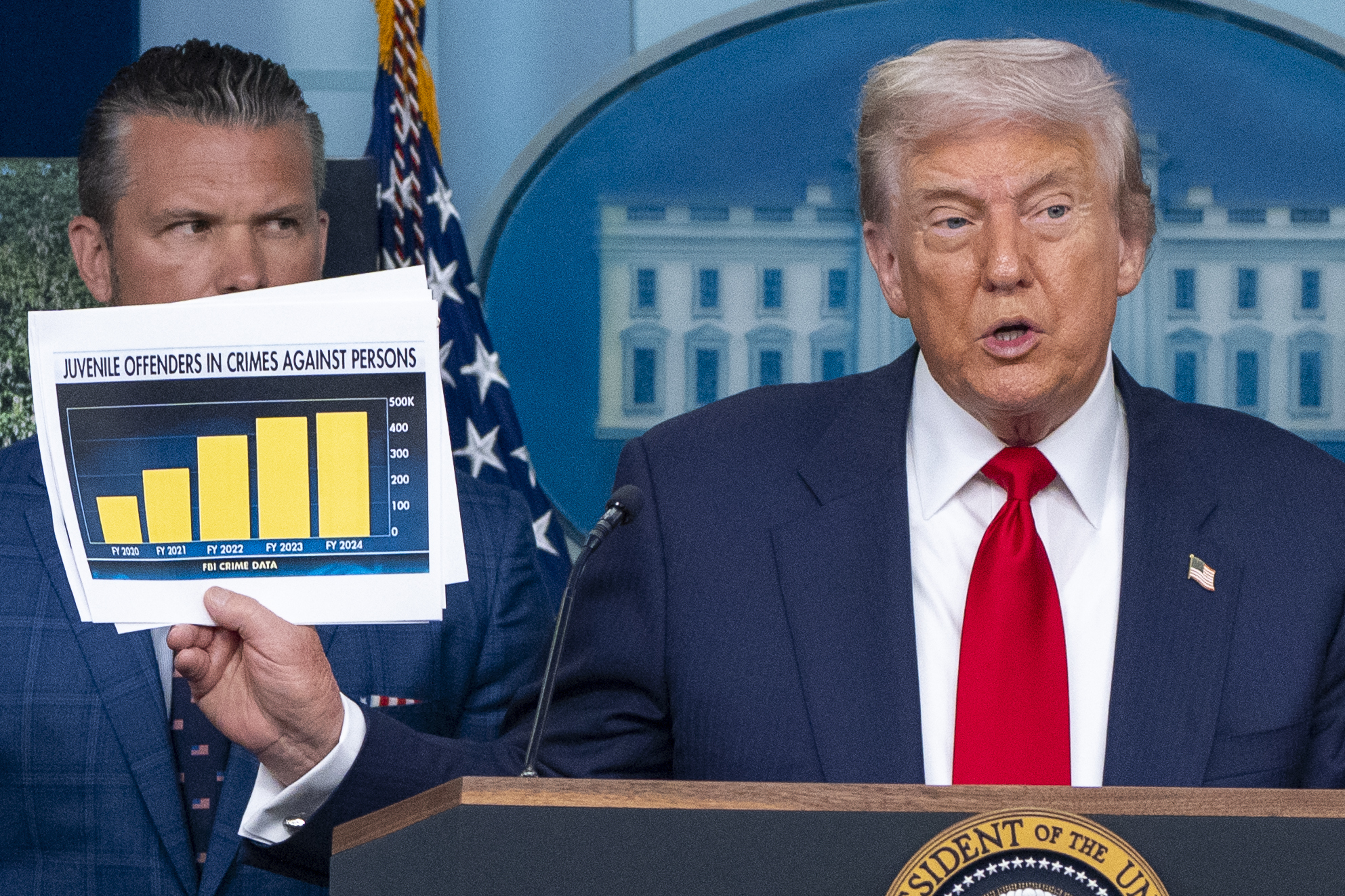
There was a time not long ago when prominent Republicans and conservatives—worried Donald Trump might win the GOP presidential primary, and then lose the general election—spoke plainly about the risk that his vicious, bigoted campaign of incitement against Muslims, immigrants, and other minorities would lead to bloodshed.
Before Trump defeated him in the primary, Sen. Marco Rubio (R-FL) warned that Trump’s Muslim bashing could have “life-and-death consequences for people in the real world.” Before Trump secured the nomination, Mitt Romney gave a whole speech about how Trump’s grotesque rhetorical habits could lead the country into the “abyss.”
This weekend, an antisemite killed 11 elderly Jewish people in a Pittsburgh, PA synagogue, egged on by Republican officialdom and the conservative movement in his false belief that wealthy Jews are financing caravans of Central American migrants bent on infiltrating the United States. It took this ghastly pogrom to wrest the country’s attention away from a different horror, in which one of the president’s most ardent supporters sent mail bombs to over a dozen regular, high-profile targets of Trump’s smears.
The horrors these formerly anti-Trump Republicans warned about have predictably come to pass, and yet the best we can expect out of any of them is mealy-mouthed dissembling about Trump’s inculpability, lame pleas for civility ‘on both sides,’ or gutless stands against abstractions like “hatred.”
It was once widely believed that Republicans would tolerate only a certain level of depravity from Trump, that they would contain his seemingly limitless appetite for dehumanizing immigrants, minorities, and others outside his base of support. It remains fashionable to wonder aloud what the party’s breaking point might be.
There is no breaking point—not for people committed to the conservative project in America. Trump has driven a relatively small number of disgusted conservatives out of that project. But those who remain have accepted that the only way to advance their goals—enormous, regressive tax cuts, an unprecedented retrenchment of the welfare state, Christian religious supremacy—is through an increasing ratchet of racial division. Unless incentives change, they will press ahead with that strategy, even amid death and defeat.
The backdrop for the synagogue massacre was an all-consuming conservative effort to stoke panic about a group of desperate Central American migrants, fleeing violence and depravation through Mexico, a thousand miles from the U.S. border. This latest act of GOP-fanned incitement continues now, even in the aftermath of the slaughter, but the backdrop for it is a Republican midterm campaign foundering on the party’s governing record. Republicans have not campaigned on their signature legislative accomplishment—an enormous tax cut for wealthy individuals and corporations—at all. To the extent that they have campaigned on any policy stakes, it has been with stunning, Orwellian lies about health care and taxes. Members of Congress who voted to repeal the Affordable Care Act’s protections for people with pre-existing conditions have run ads claiming to have championed those protections. Republicans suing the government in the hope that the Supreme Court will throw out those protections for them are also pretending to support those measures. The president and vice-president are all-in on that lie, and have thrown in another outlandish lie about a fictional middle-income tax cut, to boot.
These are not disconnected campaign dynamics. The Republican plan—both to limit their losses in the midterm, but also to survive as a political institution, is to deceive as much of the public as possible about the party’s agenda, and then pivot to race hatred. The caravan is a contrivance with no meaningful relation to the election stakes, but Trump is desperate to close out the campaign whipping up a panic about an imaginary, sinister nexus of Jews and Muslims and Latinos, because that serves his political and personal ambitions better than a campaign focused on his health care lies, which in turn is preferable to a campaign focused on the truth about the GOP agenda.
The irreducible aim of Republican politics in the modern era is to scam people into voting for tax cuts for billionaires with various forms of ethnic, racial, sexual, and cultural incitement. And at every turn, when people have grown wise to the scam and peeled away, Republicans have chosen to ratchet up the incitement, and further muddy the waters about the cynicism of their political project, rather than moderate the agenda. Trump is more than anything a symbol of this ratchet—Republican politics are uglier and more naked now than they were during the Obama and Bush presidencies, but the basic strategy is unchanged.
The normal way to impel Republicans to ratchet in the other direction would be to defeat them repeatedly at the polls. This was President Obama’s “break the fever” theory, and to some extent Republicans understand that their strategy is not a surefire winner, because they pair incitement with a variety of vote-suppression tactics aimed at Democratic constituencies.
But the terrible truth about this fusion of ethno-nationalist authoritarianism and plutocracy is that, under current circumstances, consistent electoral defeats alone won’t dislodge it. When Republicans lose elections, the ones swept out of office tend to be from closely divided districts and states, which means those who survive are, on average, more reactionary than the previous class of Republicans. When Democrats win elections, the right-wing propaganda apparatus continues fuel paranoia about the liberal agenda. After successive wipeouts in 2006 and 2008, Republicans did not shake free of the conservative grip—rather, they sold the Tea Party lies about death panels and embraced birthers. When Obama won re-election, Republicans briefly considered then rejected a party proposal to pare back the culture wars and compete for the votes of immigrants and LGBT people. Rubio, Romney, and others didn’t sound the alarm about Trump in 2016 out of a burning commitment to inclusiveness, but because they worried Trump had overshot the ideal mix of deception and culture war antics, and would thus lose the election. They ultimately embraced Trump, who ran an unapologetically racist campaign, modulated only with lies—like today’s tax cut and health care lies—about his support for universal health care and old-age entitlements. When he won, they set about trying to kick millions of people off of their health plans and funnel “savings” to the wealthy. When that effort ran aground, they gave the wealthy an enormous tax cut anyhow, and then embarked on a diversionary campaign of lies, racist scapegoating, and agitprop to save their congressional majorities. Should Democrats win control of Congress anyhow, this recent history will repeat itself, led by the same cast of plutocrats and media figures who desperately want to preserve the tax cuts they’ve already been given.
Every incentive points the same way. The answer to every strategic doubt is always to lie more and stoke more ethnic division in order to protect tax cuts and corporate deregulation—a combination of choices that sustains both a large, paranoid right-wing media audience and upward income redistribution, and thus leaves the system well financed. The caravan is good for business, but it’s also good for Business.
Winning elections is necessary but not sufficient to disrupt this sordid alliance. At some point, the people who prop it up and profit from it have to become convinced that it is no longer a viable path to wealth, power, and success. New elections require just a few months’ patience, and if in the meantime the right’s political, media, and financial leaders can coast on business as usual, they will wait out brief hiatuses.
As long as our political system responds to the bloody and divisive nature of right-wing politics by decrying “fear,” or incivility on both sides, or by ignoring the moral dimensions of the Republican scam, treating it only as a political tactic that might or might not “work,” the ruling illiberal alliance will soldier on as they have been. It will only come apart if their interests outside of politics are imperiled by their involvement in politics—if decent people engage in the kinds of boycotts and acts of targeted social censure that can change people’s incentives.
Progressive boycott campaigns helped drive Bill O’Reilly out of Fox, and almost ended Laura Ingraham’s career there, and should be expanded to encompass the entire network. Companies that market products to the masses should fear advertising them on Fox and other, smaller right-wing propaganda outlets, too. Working for those outlets should be career suicide, rather than a springboard to respectable mainstream media jobs, and the people who have thrived within the right-wing propaganda ecosystem should be shunned outside of it. Democrats could similarly name and shame the right-wing plutocrats like Trump, Sheldon Adelson, the Koch brothers, and others who support and benefit from the arrangement, and progressives could organize protests and boycotts of their properties and other interests. Social media companies that allow propaganda and racist incitement to thrive on their platforms for profit would also need to feel the sting.
Elections are important. But absent a concerted effort to marginalize the people and institutions that engage in and facilitate this kind of politics, the politics itself won’t change, and the march toward right-wing insurrection will continue.



